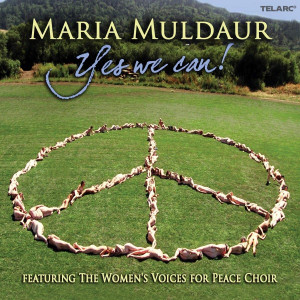 When Maria Muldaur was thinking about creating her 35th album (wow! Is it that long since “Midnight At the Oasis”?) she wondered, “What is there left to sing about?” She’s been recording collections of Dylan tunes and “naughty blues,” and turning out excellent records all along, but she’s never made a protest record before. So … she thought about that long and hard. She writes in the liner notes, “What’s been weighing on my heart and mind so heavy it hurts, is the sad, deplorable, alarming condition of our Planet today — wars, nuclear proliferation, global climate change, rapid depletion and rape of the Earth’s once bountiful resources, genocide, poverty, starvation … the concept quickly morphed into a pro-peace album, because I realized the issues that concern me go much deeper than just singing clever songs that ‘diss’ the current leaders in power and the irresponsible, destructive havoc they have wreaked upon our world.”
When Maria Muldaur was thinking about creating her 35th album (wow! Is it that long since “Midnight At the Oasis”?) she wondered, “What is there left to sing about?” She’s been recording collections of Dylan tunes and “naughty blues,” and turning out excellent records all along, but she’s never made a protest record before. So … she thought about that long and hard. She writes in the liner notes, “What’s been weighing on my heart and mind so heavy it hurts, is the sad, deplorable, alarming condition of our Planet today — wars, nuclear proliferation, global climate change, rapid depletion and rape of the Earth’s once bountiful resources, genocide, poverty, starvation … the concept quickly morphed into a pro-peace album, because I realized the issues that concern me go much deeper than just singing clever songs that ‘diss’ the current leaders in power and the irresponsible, destructive havoc they have wreaked upon our world.”
She says a lot more in her perceptive and passionate notes, but she says as much or more in the performances contained on this dazzling new CD. Yes We Can is a song cycle designed to encourage us to make a change, to fight for something better. The songs are brilliantly chosen from a cross section of contemporary writers. That is, contemporary with Muldaur (and this listener), but their message is still resonant today. Maybe moreso.
Starting off with a rocking guitar rhythm comes Maria’s rendition of Earl King’s “Make a Better World.” If memory serves, I first heard this by the Pointer Sisters, and Maria brings the Women’s Voices for Peace Choir on board for vocal support. Maria’s band throughout the album’s 13 songs is called the Free Radicals. Now free radicals are defined as “atoms, molecules or ions with unpaired electrons on an otherwise open shell configuration …” or, of course, it could mean free thinkers at liberty. I think that’s the meaning this hot quartet would prefer. David Torkanowsky (keyboards), Tony Braunagel (drums), Hutch Hutchinson (bass), and Shane Theriot (guitars) simply provide rock solid support on every track.
Marvin Gaye’s “Inner City Blues,” Allen Toussaint’s “Yes We Can, Can,” and a trio of Bob Dylan tunes (“John Brown,” “License to Kill” and “Masters of War”) continue the theme and they are fleshed out by some less familiar, but every bit as potent songs by Buddy Miller, Norman Whitfield, and others. Special guests join in too: Bonnie Raitt and Linda Tillery add their voices to “Yes We Can, Can,” Joan Baez, Odetta and Holly Near sing along in Garth Brooks’ “We Shall Be Free,” and Phoebe Snow, Jenni Muldaur and Jane Fonda also make appearances. Much of the music has a Louisiana funk feel, but there’s also the pure country of “This Old World” and the urban blues of “War” which both feature Maria on fiddle in two very different contexts.
This is a beautifully constructed, wonderfully played collection, and it’s as funky as all get out. Gotta love it! And, if it inspires just a few people to work toward making this world a better place, then Maria will have done her job. Yes indeed.
(Telarc, 2008)
